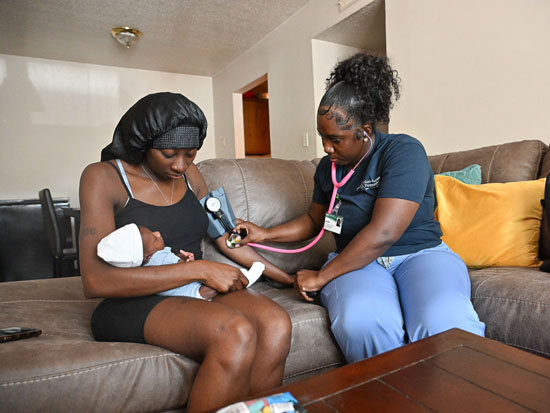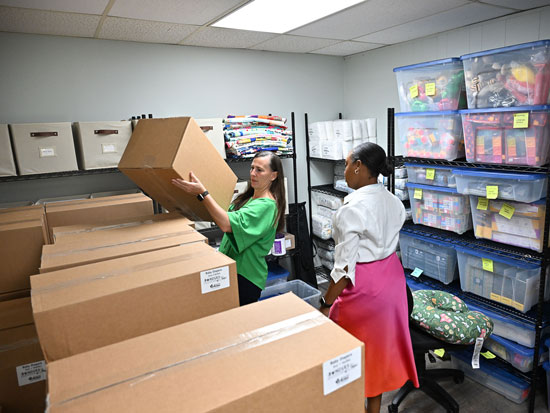
By Pareasa Rahimi
The Nurse-Family Partnership of Central Alabama team has expanded into Mobile County in South Alabama through an $8.8 million Health Resources and Services Administration expansion grant. Serving the Gulf Coast region, the UABSON’s newest team includes six nurses, a nurse supervisor, as well as a certified nurse-midwife. Since the opening of the Mobile office in April 2024, NFP has received more than 200 referrals and confirmed 52 enrollments into the program, and more than a third of referred clients are enrolled into home visiting.
“With the shrinking access to maternity care in rural south Alabama, nurse visitation is one solution that creates a safety net for families, as the nurse advocates for and connects families to local resources that support pregnancy and parenting,” said Associate Professor and Director of the Nurse-Family Partnership of Central Alabama Candace Knight, PhD, RN, FAAN (BSN 1997, PhD 2013).
The program also continues to focus on providing mental health care to clients during and post-pregnancy. The 2023 publication, “Improving Anxiety and Depression in Pregnant Mothers Participating in Nurse Home Visitation,” by Knight, Assistant Professor Karmie Johnson, DNP, CRNP, PMHNP‐BC, CNE (MSN 2011, DNP 2016), and others on the NFP team, highlights mental health improvements through the program that included services led by Johnson, who is a mental health nurse practitioner. Included in those services are telehealth sessions offered weekly by Johnson and psychiatric-mental health nurse practitioner residents through another HRSA grant led by Professor and Associate Dean for Clinical and Global Partnerships Michele Talley, PhD, CRNP, ACNP‐BC, FAANP, FAAN, FNAP (MSN 2005, PhD 2015). All NFP clients are eligible to receive services through the telehealth clinic.

“Across Alabama, but particularly in our rural counties, there is a lack of mental health treatment centers and providers,” Johnson said. “Telehealth tries to close this gap by providing access to practitioners who can assess, prescribe and treat. Our mothers can receive care for pre-existing and perinatal mood disorders. I’m especially proud that we’re working to normalize the conversation around postpartum anxiety.”
Plans to offer additional services in the Gulf Coast are underway, including therapy via telehealth provided by NFP’s lead social worker, Claire Harris, LICSW-S, who currently works in the Central Alabama office. NFP nurses also are helping clients get connected with local primary care providers with consistent medical care after the postpartum period.
NFP’s commitment to delivering comprehensive care involves collaboration with clinical partners. The UAB Nursing Partnership between the School and UAB Medicine has enabled NFP access to electronic health records to better document information for obstetricians and other providers and improve overall communication across providers.
Building community partnerships
Regular home visits and check-ins with expectant mothers and families has led to the cultivation of long-term relationships, with clients who have become champions of NFP. Former client Tia Jackson joined the Central Alabama office in March as an Outreach Coordinator, managing referrals for the program. She now has the opportunity to connect with and help support other families.

"Nurse-Family Partnership is a life-changing experience, and I have accomplished so much in such little time with them,” Jackson said. “The nurses are like family—they genuinely care about both your and your baby’s wellbeing, and now to be behind the scenes is even more of a life-changing experience that has made an amazing impact on my life."
Community outreach is an essential component of NFP’s expansion across the state. Each region included in the HRSA-funded expansion has a community advisory board and maternal child health roundtable. NFP held its first quarterly community advisory board meeting for the Gulf Coast virtually in August, inviting community partners to connect and discuss updates and outcomes.
“Local community partnerships are absolutely necessary to meet the needs of families. The geographic, social and economic barriers faced by rural and underserved families, in particular, requires a host of services to ensure that mothers and babies have access to everything they need to be healthy and achieve their goals,” Knight said. “There is not one organization that provides everything necessary to help families. Local community-based organizations must work together, and fortunately, cooperation is a strength of these types of organizations.”